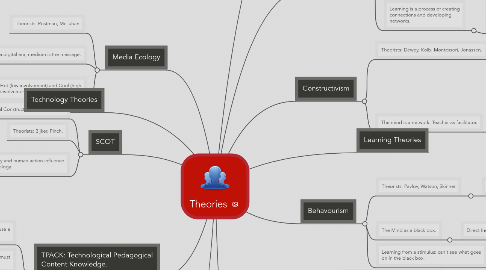
1. Media Ecology
1.1. Theorists: Postman, McLuhan
1.2. In a digital era, medium is the message.
1.2.1. "The idea that technology and techniques, modes of information and codes of communication play a leading role in human affairs." The Media Ecology Association.
1.3. Hot (low involvement) and Cool (high involvement) media.
2. SCOT
2.1. Social Construction of Technology.
2.2. Theorists: Bijker, Pinch.
2.3. Society and human action influence technology.
2.3.1. Symmetry.
2.3.2. Closure.
3. Technology Theories
4. Learning Theories and Technology Together
5. TPACK: Technological Pedagogical Content Knowledge.
5.1. Technology: Knowing how to use a computer/software.
5.2. Content: Material as a teacher that you must teach.
5.2.1. All together TPACK, Surrounded by context.
5.3. Pedagogical: Knowing how to teach the content.
6. Cognitive Load Theory / Cognitivism
6.1. Theorists: Piaget, Gagne, Bruner
6.1.1. Key Ideas.
6.1.1.1. Schema/Scaffolding
6.1.1.2. Atkinson-Shiffrin Memory Model
6.1.1.3. Working Memory, Meaningful effect.
6.2. Beyond behavior into the black box
6.2.1. Practice for retention, Organization, Memory Palace
6.3. Memory systems are active, organized processors of information.
6.3.1. Cognitive Load Theory
6.3.1.1. Things must run smoothly in order for meaningful learning to occur.
6.3.1.2. Processing information can over or under load working memory.
6.3.1.2.1. Chunking, Learning structures, Instructional design.
6.4. The Mind is a computer.
7. Connectivism
7.1. Emerged in 2006, Key speakers George Siemens and Stephen Downes.
7.1.1. Learning Theory of the digital age.
7.1.1.1. Learning and knowledge rests in diversity of opinions.
7.1.1.2. Learning may reside in non-human appliances.
7.1.1.3. Nurturing and maintaining connections is needed to facilitate continual learning.
7.2. Learning is a process of creating connections and developing networks.
7.2.1. "knowledge is distributed across a network of connections...that learning consists of the ability to construct and traverse these networks"
7.2.1.1. Networks are a set of connected nodes
7.2.1.2. Nodes are anything to be connected to another node.
7.2.1.3. Nodes can include people, information, data, feelings, images, etc.
7.2.1.4. Learning can exist outside of people.
8. Constructivism
8.1. Theorists: Dewey, Kolb, Montessori, Jonassen.
8.1.1. Learning is building connections by interacting with the environment.
8.1.2. Learning comes from constructing knowledge from your own experiences.
8.2. The mind is a network. Teacher as facilitator.
8.2.1. Problem-based learning/Project-based learning
8.2.2. Active learning the responsibility of learners
8.2.3. Learning is the most effective when learners create real world objects.
9. Learning Theories
10. Behavourism
10.1. Theorists: Pavlov, Watson, Skinner
10.1.1. Key Ideas
10.1.1.1. Stimulus Response (repetition)
10.1.1.2. Operant Conditioning (reinforcement)
10.1.1.3. Punishment, Consequences, Modelling
10.2. The Mind as a black box.
10.2.1. Direct Instruction: Teacher Directed.
10.3. Learning from a stimulus: can't see what goes on in the black box.
10.3.1. Practice makes perfect
